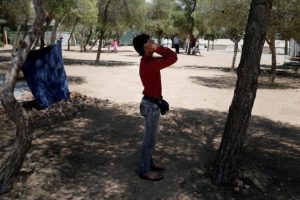BERLIN/BASTAD, Sweden/ATHENS – For thousands of Muslim refugees in Europe, Ramadan came to revive their dreams of reunion with family, comfort and palatable food, as they now find it so difficult to mark the holy month thousands of miles away from home.
“You can’t have Ramadan without good food,” said Syrian asylum seeker Khairallah Swaid, sitting next to his brother Hamza at Sham (Levant), a popular Syrian snack bar in Neukoelln, a poor district of Berlin with a large migrant population, Reuters reported on Tuesday, June 7.
Swaid, who lives in a shelter, north of the German capital, spends most of the 120 euros ($136), his monthly wages, on food.
He and other asylum seekers chip in for flatbread, rice and vegetables, which they cook using a kettle.
“I miss my wife, but during Ramadan I will miss my mother’s food more,” he uttered jokingly a few days before Ramadan, adding that his wife is stranded at a camp in Greece.
Many shelters in Berlin are hosting Ramadan for the first time and some are trying to ensure a pleasant dining experience.
A similar situation was reported in Sweden’s Hemmeslovs Herrgard asylum camp where a 25-meter line awaited breakfast meal.
Magnus Falk, the camp manager, stood with a bag of bread in his hand, trying to calm people down.
“They were dissatisfied with the content of the breakfast snack,” he said. About half of the 300 residents observes Ramadan. They all get a bag of bread with sausage, yogurt, cheese and jam to eat just before dawn breaks at around 03:30 am to bolster themselves for another day of fasting.
Mohammed, a Syrian from a town near Aleppo, who came with his family of five to Sweden nine months ago, is not impressed with the food at home.
He says migrants try to make it more appetizing by adding spices.
“Normally we cook very nice Arabic food during Ramadan and eat with friends, but here we are alone. But we still celebrate Ramadan, because it is a tradition,” he said.
Return Home

A migrant prays during the first day of Ramadan at a state-run camp for refugees and migrants in Schisto, near Athens (Reuters)
The situation was much worse in Greece where Muslims stay in state-run tent camps, making it harder to observe the holy month under scorching sun.
“We can’t stay in the tent because it’s too hot and the children are vomiting or (have) diarrhea because the place is so dirty,” said Mahdieh, a 14-year-old living at Schisto, a state-run tent camp in a former military base near Athens.
Mahdieh, whose family fled Afghanistan’s Logar province, remembers Ramadan at home as a time when families would get together to talk, laugh and be happy.
“(Here) we have depression, we are tired, we don’t know how we can stay here,” she said.
The situation was much more unbearable for Abdul Baseer Nomand, another Afghani refugee.
Nomand used to work as a technical consultant for the German army in Afghanistan and arrived in Greece just before the borders were shut in February.
Now he lives in a tent with his wife and five children and wonders how camp authorities would accommodate their needs.
“Today is the first day. Let’s see what they have for us,” he said. “If the weather is hot, it’s very difficult for everyone because they will be thirsty. The problem is that here the environment is not suitable for proper living,” he said.
Like others forced to flee home, he longed for the time for a possible safe return back home.
“Everyone is missing his family, his country, and this is very hard,” he said.
“(It’s) so difficult for people far away from their country, from their neighbors, from their relatives.”
